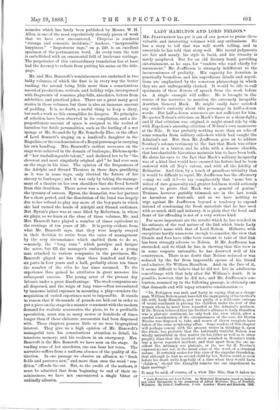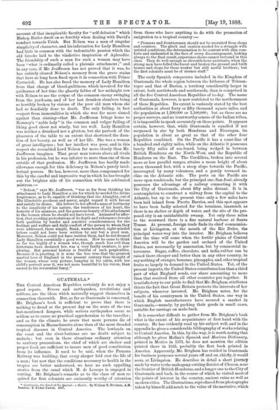LADY HAMILTON AND LORD NELSON.* Ma. JEAFFEEBON has put it
out of our power to praise these valuable and interesting volumes with any enthusiasm. He has a story to tell that was well worth telling, and in essentials he has told that story well. His moral judgments are fair and manly, his style is lucid, and his vivacity is rarely misplaced. But for an old literary hand, providing entertainment, as he says, for "readers who read chiefly for amusement," Mr. Jeaffreson is strangely indifferent to the inconveniences of prolixity. His capacity for iteration is practically boundless, and his superfluous details and repeti- tions are emphasised by the sonorous phraseology in which they are not unfrequently clothed. It would be idle to cull specimens of these flowers of speech from the work before us. A single example will suffice. He is brought in the course of hip narrative to mention the extremely incapable Austrian General Mack. He might easily have satisfied any reader's curiosity about this personage in half-a-dozen words. But hslf-a-dozen sentences are not sufficient for him.
He quotes Nelson's criticism on Mack's fiasco at a sham-fight ; and if that criticism was original, it might stand side by side with Napoleon's amusing criticism of Nelson's own manceuvre at the Nile. It was probably nothing more than an echo of some remarks from military onlookers which had caught the Admiral's ear. But then Mr. Jeaffreson goes on to adduoe Southey's solemn testimony to the fact that Mack was either a coward or a traitor, and he adds, with a demure chuckle, that less charitable historians maintain him to have been both.
He shuts his eyes to the fact that Mack's military incapacity was of a kind that would have ensured his failure had he been endowed with all Ney's valour, and with all the fidelity of Belisarius. And then, by a touch of grandiose triviality that it would be difficult to equal, Mr. Jeaffreson has the effrontery —may we call it ?—to say complacently that "none but a.
writer of rare generosity and greater boldness would seriously attempt to prove that Mack was a general of genius." Truisms, however garishly trimmed, are in the last result as harmless as fruit-salt, and as we have nothing to urge against Mr. Jeaffreson beyond a tendency to expand instead of condensing the fresh materials that he has used with so much skill and industry, it is plain that the head and front of his offending is not of a very serious kind.
Far more important are the results which he has reached in his estimate of the real nature of the link which binds Lady Hamilton's name with that of Lord Nelson. Hitherto, with exceptions hardly numerous enough to consider, the view that friends and foes have alike been content to take of that link has been strongly adverse to Nelson. If Mr. Jeaffreson has succeeded, and we think he has, in showing that this view is in some respects untenable, he has deserved well of his countrymen. There is no doubt that Nelson seduced or was seduced by the far from impeccable spouse of his friend and admirer, Sir William Hamilton. And, on the face of it, it seems difficult to believe that he did not live in adulterous concubinage with that lady after Sir William's death. It is possible, however, that he did not; and Mr. Jeaffreson's con- tention, summed up in the following passage, is obviously one that demands and will repay attentive consideration :— "Dr. Pettigrew was rash and hasty in saying that as a clergy- man, William Nelson must have felt the impropriety of his brother's life with Lady Hamilton, and was guilty of a deliberate outrage of social sentiment in placing the children under the roof of the woman whom he must have regarded as the Admiral's mistress. If Dr. Nelson believed that his brother's alliance to Lady Hamilton was a platonic sentiment, he only took the view which, after a. careful consideration of the circumstances of the case, Sir Harris Nicolas was disposed to take, and scores of clever essayists have taken of the same perplexing affair. Some readers of this chapter will perhaps concur with the present writer in thinking it, upon the whole, less probable that the habitually truthful Nelson was wholly untruthful in this matter (to his father as well as to other people), than that the incident which resulted in Iloratia's birth was a never repeated incident, and that apart from the one in- cident the intimacy was platonic, or (to use Sir H. Nicolas's expression) was not, in the usual sense of the word, of a criminal nature. It certainly makes for this view of the singular friendship, that although he had no second child by her, Nelson could so soon before his death write hopefully of a time when they would have children,' should the Almighty remove the one impediment to their marriage."
It may be said, of course, of a view like this, that it takes no • Lady Hamilton and Lord Nelson. An Historical Biography, based on Letters and other Documents in the possession of Alfred Morrison, Esq., of Fonthill,, Wiltshire. By John O. Jeaffreson. 2 yob. London : Hurst and Blacketa. 18.
account of that inexplicable faculty for " self-delusion " which Bishop Butler dwelt on so forcibly when dealing with David's conduct towards Uriah. But Nelson was a man of singular simplicity of character, and his infatuation for Lady Hamilton had little in common with the indomitable passion which the old Greeks laid to the vindictive inspiration of Aphrodite. The friendship of such a man for such a woman may have been "what is ordinarily called a platonic attachment ;" and in any case, if Mr. Jeaffreson has not proved that it was, he has entirely cleared Nelson's memory from the grave stains that have so long been fixed upon it in connection with Prince Carracioli. He has also freed the memory of Lady Hamilton from that charge of blood-guiltiness, which invented for the quidnuncs of her time the ghastly fables of her midnight row with Nelson to see the corpse of the common enemy swinging from the yard-arm, and of her last drunken slumbers being so horribly broken by visions of the poor old man whom she had so fiendishly done to death. The only failing, in fact —apart from immoralities in which she was far more sinned against than sinning—that Mr. Jeaffreson brings home to Romney's "noble lady" is the common and vulgar failing of
liking good cheer not wisely, but too well. Lady Hamilton was neither a drunkard nor a glutton, but she partook of the
pleasures of the table to an extent that shortened the dura- tion of her beauty, as well as of her life. She was a woman of great intelligence ; but her intellect was poor, and in this respect she resembled Lord Nelson far more closely than Mr. Jeaffreson imagines. That great man towers above all rivals
in his profession, but he was inferior to more than one of them outside of that profession. Mr. Jeaffreson has hardly made
allowance enough for this deficiency in Nelson's purely intel- lectual powers. He has, however, more than compensated for this by the careful and impressive way in which he has brought out the brighter side of his connection with his celebrated mistress :—
"Nelson," says Mr. Jeaffreson, "was so far from thinking his attachment to Lady Hamilton a sin for which he needed the divine forgiveness, as to be capable of thinking that the Almighty, out of His illimitable goodness and mercy, might regard it with favour and satisfy its desire. His letters to her afford a mass of testimony to the simplicity of his nature, the tenderness of his heart, the honesty of his manners, and the generous beauty of his attachment to the woman whom he should not have loved. Animated by affec- tion, that avoiding protestations of its depth and vehemence reveals both qualities by tender and sensitive considerateness for the feelings and welfare and daily comfort of the person to whom they were addressed, these simple, frank, warm-hearted, right-minded letters could not have been written by any but a good man. Moreover, Nelson could not have written them, had he not deemed Lady Hamilton essentially a good woman. How he came to think so far too highly of a woman who, though much less evil than historians have declared her, was a very faulty creature, is per- plexing. But personal history is fruitful of such perplexities. Because it is puzzling, it is none the less true that the greatest martial hero of England in the present century thus thought of the woman, whose very picture, hanging in his cabin, with her child's portrait near it, was not more beautiful to his vision, than sacred to his reverential fancy."



































 Previous page
Previous page